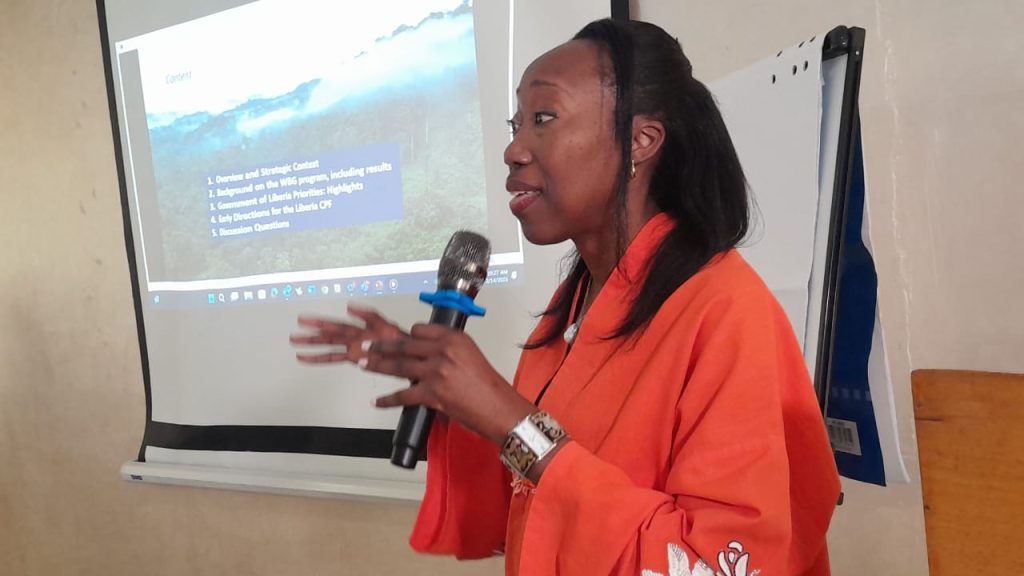The World Bank Group (WBG) recently held a consultative symposium in Gbarnga, Bong County, Liberia, to gather local input for its new Country Partnership Framework (CPF) for the fiscal years 2025-2030. This framework will guide the WBG’s engagement with Liberia over the next five years, aligning with the government’s Agenda for Inclusive Development (AAID) and focusing on achieving impactful results. The CPF aims to address the country’s development challenges and capitalize on its potential for growth and poverty reduction. The consultation process is crucial for ensuring that the CPF reflects the needs and priorities of the Liberian people and fosters a strong partnership between the WBG, the government, and various stakeholders.
The symposium included a review of the previous CPF (2019-2024) through a Competition and Learning Review (CLR). The CLR highlighted Liberia’s resilience in the face of challenges like the COVID-19 pandemic and global economic instability. It acknowledged progress in macroeconomic stability, transparency, accountability, education, and healthcare. However, the review also identified persistent challenges in areas such as tax revenue mobilization, infrastructure development, private sector growth, government capacity for contract monitoring, and weak contractor performance, leading to project delays and inefficiencies. These findings are informing the development of the new CPF to ensure it effectively addresses these ongoing issues.
The draft CPF for 2025-2030 centers around improving the quality of life for Liberians through three interconnected pillars: inclusive service delivery, inclusive growth, and inclusive jobs, all underpinned by accountable governance. This holistic approach recognizes that sustainable development requires improvements across multiple sectors, including education, energy, agriculture, and governance. The framework aims to create opportunities for all Liberians, particularly vulnerable groups, and ensure that the benefits of growth are shared equitably.
The CPF has identified five key outcomes to achieve its overarching goals. First, it aims to reduce learning poverty and enhance primary education by improving foundational literacy and numeracy skills, focusing on better teacher training, expanding access to schools, and addressing factors contributing to high dropout rates, particularly among girls. Second, it seeks to expand access to energy through renewable energy projects, such as hydropower and solar, emphasizing private sector participation and institutional strengthening for sustainable energy development. This will ensure reliable and affordable energy for more Liberians, supporting economic growth and improving living standards.
Third, the CPF targets productivity and sustainable agro-industry and forestry. This involves developing agro-processing and sustainable commercial forestry to drive economic growth and create jobs, especially for women and youth. The focus will be on climate-smart agriculture, improved forestry governance, and value chain development, ensuring sustainable and inclusive growth in these sectors. Fourth, the framework aims to enhance economy-wide productivity and public capital management reform. This includes strengthening the business environment, improving the investment climate, increasing trade efficiency, and expanding access to finance, with a focus on public-private partnerships. These measures will stimulate private sector growth and create more job opportunities.
Finally, the CPF prioritizes accountable governance by modernizing the public sector to improve transparency, combat corruption, and enhance service delivery. This involves reforms in public investment, financial management, and land tenure to build a more resilient and effective governance system. This focus on good governance is essential for ensuring that resources are used effectively and that development initiatives benefit all Liberians. The consultation process emphasized the importance of local input in shaping the CPF, ensuring that it is aligned with the needs and priorities of the Liberian people and contributes to sustainable and inclusive development. The participation of various stakeholders, including government ministries, the student community, and civil society organizations, demonstrates the collaborative approach adopted by the WBG in developing this crucial framework for Liberia’s future.


